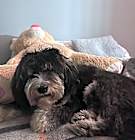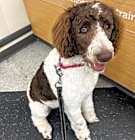You can adopt a Shepadoodle through a rescue that specializes in Shepadoodles. A great place to start is with a breed search on Adopt a Pet, which will show you all the available Shepadoodles in your area.
Adopt A Shepadoodle
We don't see any Shepadoodle available for adoption in your exact location or cities near you. Search for more dogs, or check out some adorable similar breeds below!
Search for Shepadoodle puppies and dogs
30 available dogs near you

Monty
Goldendoodle
Male, 4 mos
West Hollywood, CA
Good with dogs
Not good with cats
Shots are up-to-date

Milo
Goldendoodle
Male, 4 mos
West Hollywood, CA
Good with dogs
Not good with cats
Shots are up-to-date

Sprocket
Poodle (Standard) Labrador Retriever
Male, 4 yrs 7 mos
Beverly Hills, CA
Not good with dogs
Not good with cats
Needs experienced adopter
Spayed or Neutered
Shots are up-to-date

Angel
Poodle (Standard)
Female, 3 yrs 7 mos
Los Angeles, CA
Not good with dogs
Not good with cats
Spayed or Neutered
Shots are up-to-date

Tyrone
Poodle (Standard)
Male, 1 yr 1 mo
Los Angeles, CA
Good with dogs
Not good with cats
House-trained
Spayed or Neutered
Shots are up-to-date


RUSTY
Poodle (Standard) Sheltie, Shetland Sheepdog
Male, 3 mos
Los Angeles, CA
Not good with dogs
Not good with cats

Shelby
Labradoodle Goldendoodle
Female, 10 mos
Santa Monica, CA
Good with dogs
Not good with cats
House-trained
Spayed or Neutered
Shots are up-to-date

Willow
Poodle (Standard)
Female, young
Los Angeles, CA
Good with dogs
Not good with cats
House-trained
Spayed or Neutered
Shots are up-to-date

Matisse von Marseille
Poodle (Standard)
Male, young
Los Angeles, CA
Not good with dogs
Not good with cats
Spayed or Neutered
Shots are up-to-date

Hanna
Goldendoodle
Female, 4 mos
Shadow Hills, CA
Good with dogs
Good with cats
House-trained
Spayed or Neutered
Shots are up-to-date

Blade
Goldendoodle
Male, 3 mos
Shadow Hills, CA
Good with dogs
Good with cats
House-trained
Spayed or Neutered
Shots are up-to-date


Rocky
Labradoodle American Pit Bull Terrier
Male, young
Glendale, CA
Not good with dogs
Not good with cats
Find adoptable Shepadoodle by Beverly Hills, CA
Animal shelters near Beverly Hills, CA
Adopting a Shepadoodle
Frequently asked questions about acquiring an Shepadoodle - the pros and cons of adopting versus going through a breeder, and associated costs.
Shepadoodles cost between $75 and $300 when adopted from a rescue or shelter. If you buy one from a breeder, it can cost between $900 and $3,000.


